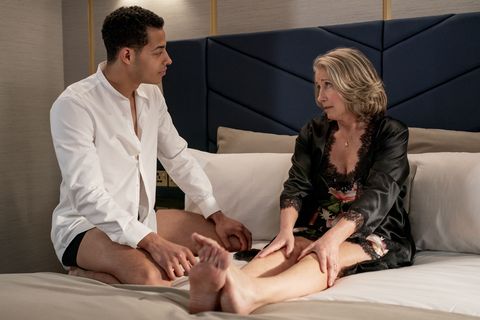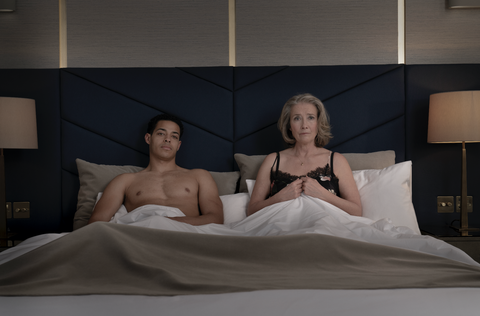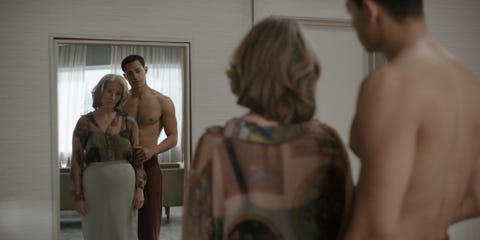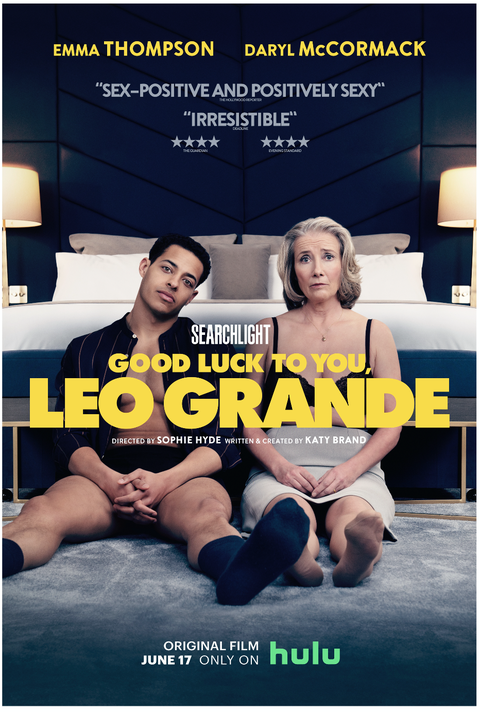With a career that’s spanned more than three decades and earned a plethora of awards, including two Oscars, Emma Thompson doesn’t need to play by anyone else’s rules. And while her illustrious resume includes everything from Love Actually to Sense and Sensibility to the Harry Potter franchise, it’s possible that Thompson has never been better than she is right now.
In her new film Good Luck to You, Leo Grande, which is now streaming on Hulu, Thompson plays widow and retired schoolteacher Nancy who, after a lackluster life of little sexual pleasure, decides to hire a sex worker for the night. The result is a vulnerable and witty film in which its two leads—Thompson and Peaky Blinders actor Daryl McCormack—sparkle.
ELLE.com caught up with Thompson to talk about Good Luck to You, Leo Grande, how she approaches onscreen nudity, and whether she really auditioned for Basic Instinct.
Good Luck to You, Leo Grande is such an intimate and funny movie. Why were you drawn to playing Nancy? And did you have any reservations about signing on for it?
I had no reservations. I mean, I just didn’t. I don’t think that I knew quite the depth of what I was getting into, actually, if I’m honest, but I had no reservations whatsoever. It seemed to me that the situation of this woman waiting for that knock on the door [from Leo Grande at the start of the film] was just so original. I’d never seen anything like that. So first of all, the idea was funny and appealing and kind of just delicious.
And then as I read through it and listened to these two people, who are so different, separated by so many things, and yet are able to achieve an intimacy that I’ve rarely seen on screen, actually. Because the place that they finally reach is hugely touching to me. The unlocking, really, that they offer one another. … That was when I truly understood how deeply emotional it was, as well as funny and touching and kind of radical, you know?
There aren’t many films that focus on female desire. Were there any difficulties getting the movie made?
No, there weren’t many difficulties, you’d have to ask the producer, but I mean, it was a small budget. You see, there were only two of us and a 19-day shoot. So the real challenges were finding the right director, and Sophie Hyde was just the most perfect choice ever, and hitting her just at the right moment in her life. And obviously the right actors, and getting the tone of it right. Because it’s quite a fine line. If it had leaned too much to sort of complete comedy, then it could have been a little clumsy and perhaps might not have worked. And if it veered too much towards the dramatic, then it could have gotten unpalatable in some way.
The writing kept us safe and Sophie’s camera work with Bryan Mason, her wonderful DP [director of photography]. We felt like every day we were getting the right tone. We had lots of variations because we were long, long takes. We would do 12 pages of dialogue in one go, because we only had this short time to make it. And perhaps the intensity of that helped in creating the kind of ludicrously intense feelings that you get while you’re watching it, because you are sort of in the room with them and Sophie’s intention was really to help you to feel what they were feeling rather than watching them, you know?
The chemistry between the two of you is fantastic. Did you always know actor Daryl McCormack was going to play Leo Grande, and how did you nurture that connection with him?
No, we didn’t know. In fact, he came on quite late. We had lots of ups and downs with casting, and when I met Daryl for the first time, I thought, “This young man’s so thoughtful.” He just really thought about Leo so hard and you could tell that he was so engaged with him and I knew that was essential. I could also tell that he was quite at ease with his own body and his height. Actually, his height was part of it because Nancy’s been a teacher all her life. She stood up, and everyone’s looked up to her for years and years. It’s time for her to look up. It was just a simple physiological thing. But it was one of the things that persuaded me that he was right, and luckily everyone else just thought he was great. We were so lucky to find him.
I think as well it’s to do with timing. … Daryl had exactly what he needed to play Leo at that moment in time. It hit him right at the right moment. And Nancy hit me at the right moment. I might not have been able to play Nancy five years ago. Even though I’ve had an awful lot more experience than Daryl, it’s timing of story and character and it’s very interesting all of that. Mysterious in a way.
How has getting older changed the roles that you’ve been offered or the roles that you’ve taken?
I think the last five to 10 years, I’ve done more interesting roles than I’ve ever done. And I’ve played people I’ve never seen. I’ve played a female judge, never seen that. I’ve played a female talk show host, never seen that, doesn’t exist. Why not? I don’t know, weird. Even in something like Cruella, a sort of dreadful maternal murderer. I’ve played a 77-year-old serial killer.
I’ve had the most extraordinary opportunities in the last few years and a lot of those have been written by women. So I feel incredibly privileged and lucky. I really do. Because I think this has been the most fascinating time. The roles I was being offered in my forties were really very boring. They were all wife roles, so I did other things actually.
I read that you auditioned for Sharon Stone’s part in Basic Instinct. Is it true? And do you think you’d have had a completely different career if you’d gotten a role like that early in your career?
Well, it’s sort of apocryphal, but I did meet [director] Paul Verhoeven. I think at the time I happened to be working in L.A. and he was casting. And I don’t think anyone seriously thought that I was suitable for it because I didn’t fit the criteria at all. But I went to see him and I just remember him saying, “I think you fall between two stools.” And I thought when I saw the film, “Which stools? Both those women are so beautiful and perfect to look at. What do you mean?”
I mean, it was very odd, but yes, it’s a funny story, but I don’t think it was a serious move on the part of my agents. I think they knew, fine. But you never know, Paul Verhoeven might later on have gone on to make something about the two stools I fell between.
I know you’ve talked about this to death, but I loved seeing an un-airbrushed woman standing in front of a mirror looking at herself in Leo Grande. It shouldn’t be revolutionary. But to me that was…
But it is.
So meaningful, especially because I struggle with looking at myself and I’m sure lots of women do. What was that scene like? And what advice do you have for people who are struggling with the unrealistic expectations that the internet puts on them?
I think recognizing the unrealistic nature of it is good. You don’t have to look at your body, whatever it is and think, “Oh, that’s great.” But you can learn to look at it more neutrally, the neutral gaze, which is what I was trying to get when I was playing Nancy, standing there looking at herself. What I didn’t want her to do, having looked at herself with great judgment, I didn’t want to do the opposite thing. I didn’t want her to stand there looking at herself as though she thought she was gorgeous. That was wrong. But I did want her to stand there in a completely relaxed fashion and accept what she saw because it’s become hers again. She’s been released from this long, I suppose, absence in a way. She hasn’t really been present in her body.
And when you’re not enjoying sex, and it’s just as rudimentary as she describes it was, there is disassociation connected to that, not wanting to identify with your body or be inside your body. I mean, in a very mild version of what happens when people are abused and violently assaulted, there’s dissociation. And I think that’s the thing I wanted to show, someone just completely relaxed and absolutely at peace and knowing that the possibility for her to experience pleasure by herself or with other people is there for her now, having not been.
To any woman who watches that and thinks, “I can’t do that,” I would say, neutralize those feelings. You understand them; they’re there because we’ve been surrounded by impossible iconography for centuries. And because we’re not encouraged to think about our own pleasure. All of our status and our value and our worth for many, many long moons has been placed in the way in which we look. And that’s a waste of time. So, unless that’s the only way you can survive, which goodness knows in some places it is, then release yourself from that and reclaim your passion and your energy and your time and your money and your purpose in life. And just say, it’s nothing, it’s got nothing to do with your body and whether it’s acceptable or not. It’s your home, so you need to look after it and accept it.
I think that’s why this film is going to be so important and empowering for so many people. Your character also explores ageism in sexuality, and the idea that as you get older, you somehow lose your sexual power. How did you prepare for that, and was it difficult to portray that on screen?
Well, what I’m portraying most of the time is Nancy being frightened of what it is she wants. And not being able to take it. So that’s easily imagined, isn’t it really?
There’s a big enough distance between [Nancy and Leo] that they can have the most extraordinary conversations about really very taboo subjects. About being a mother. “Am I happy that I did that?” One of the most taboo things in the whole movie is about motherhood. And actually, we focus on the sex and the body aspects, but actually there’s that as well. Because I know a lot of women who wish they’d never become mothers, but you cannot say it. It’s utterly taboo. She can say it to Leo because it’s just in that room. He’s never going to judge her. He’s far enough away that she’s able to say these things.
She doesn’t even realize that what she’s doing is revealing herself in a very deep way to this person. It’s only later when she realizes how much she’s learned, how much he’s given her. You know, that she’s able to apologize for having crossed the boundaries, to acknowledge the fact that she’s gone crazy, that lust and sexual desire can make you go crazy, which is also another thing that’s fascinating about it. But her acknowledgement of what it is he’s done I find so moving as well.
And then her acknowledgement of the importance of sex, and then apologizing to a girl she’s basically slut-shamed when she was young. That’s what really moves me as well. That pleasure can release you. This pleasure has released her from an awful lot of baggage.
The film also lobbies for the legalization of sex work. Is that a topic that you have a particularly strong feeling about?
I think that we’ll never get to the bottom of sex work or, in fact, drugs without legalizing them. We have to decriminalize things that we are doing all the time. Absolutely, there’s no other way to navigate it. And decriminalization doesn’t mean to say you are deregulating. That’s what’s important to know, that decriminalization would mean there are regulations and there are protective measures in place, so everyone can relax. So if it’s work that you would like to do, because as is very clear from the conversations that Sophie and Daryl have had with sex workers, you feel passionately about it. You have a vocation for it, or you think it’s a job you might be quite good at, but actually you’ll do that and then the rest of the time you’ll cook or read books.
I think that somebody made the very good point that along with not respecting our own sexual desires, we tend to associate sex work with coercion and with a kind of diminished sense of self care. And we can understand why, because of patriarchy and because of the lack of respect for women doing anything at all, and the fact that most women weren’t allowed to work anyway. So how were they going to earn a living? There’s so many aspects to it and sex work is different and regarded differently in lots of different cultures. So it’s a complex and very varied picture. That it should be decriminalized, I think, is probably absolutely essential in order for us to, first of all, just make it safe as far as we can.
But then there’s Leo’s description of his clients, and how different they are, and his imagined world where if you can’t access sexual pleasure, perhaps you can pay for it. Perhaps it’s a service that you can have. And that’s a perfectly reasonable proposition. And as he says, imagine how much less BS there would be. Imagine how much less bullshit. And I think, too, imagine how much less sexual violence, if there were a real discussion and acknowledgement of the need [for sex].
It’s complicated because there are very few studies on the people who buy sex. Everyone keeps talking about sex workers, but actually, really we need to talk about the men who buy sex, and why do they buy sex? There’s one [researcher] who has taken testimonials from men who buy sex, and a lot of the testimonials are pretty messed up, but it’s men whose relationship with women and sex is messed up. Again, we have to look at that. Why is it messed up? … There’s quite a lot of disturbing material there, you know? And then you go, “God, is it safe for anybody?” Because these guys sound so angry. But that’s what I know because of the work that I’ve done with trafficking, but trafficking is not sex work. Trafficking is slavery, it’s sexual slavery. It’s represented in the press sometimes as sex work, but it’s not sex work. Sex work is a person who said, “I think I could be quite good at giving people sexual pleasure. And I would like to earn my living doing that.” And I can absolutely understand that someone could be good at that and make a good living.
This interview has been edited and condensed for clarity.
This content is created and maintained by a third party, and imported onto this page to help users provide their email addresses. You may be able to find more information about this and similar content at piano.io





